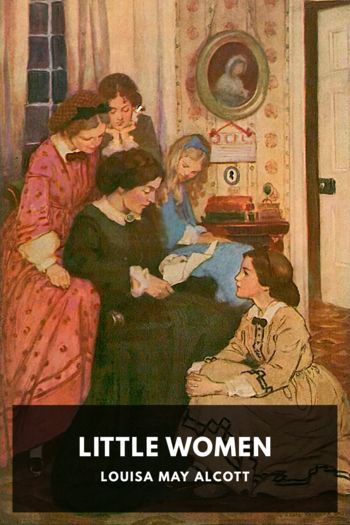Little Women Louisa May Alcott (popular books of all time txt) 📖

- Author: Louisa May Alcott
Book online «Little Women Louisa May Alcott (popular books of all time txt) 📖». Author Louisa May Alcott
“You thoughtful creter, you’re determined we shan’t miss that dear lamb ef you can help it. We don’t say much, but we see it, and the Lord will bless you for’t, see ef He don’t.”
As they sat sewing together, Jo discovered how much improved her sister Meg was; how well she could talk, how much she knew about good, womanly impulses, thoughts, and feelings, how happy she was in husband and children, and how much they were all doing for each other.
“Marriage is an excellent thing, after all. I wonder if I should blossom out half as well as you have, if I tried it?” said Jo, as she constructed a kite for Demi, in the topsy-turvy nursery.
“It’s just what you need to bring out the tender, womanly half of your nature, Jo. You are like a chestnut-burr, prickly outside, but silky-soft within, and a sweet kernel, if one can only get at it. Love will make you show your heart some day, and then the rough burr will fall off.”
“Frost opens chestnut-burrs, ma’am, and it takes a good shake to bring them down. Boys go nutting, and I don’t care to be bagged by them,” returned Jo, pasting away at the kite which no wind that blows would ever carry up, for Daisy had tied herself on as a bob.
Meg laughed, for she was glad to see a glimmer of Jo’s old spirit, but she felt it her duty to enforce her opinion by every argument in her power; and the sisterly chats were not wasted, especially as two of Meg’s most effective arguments were the babies, whom Jo loved tenderly. Grief is the best opener for some hearts, and Jo’s was nearly ready for the bag: a little more sunshine to ripen the nut, then, not a boy’s impatient shake, but a man’s hand reached up to pick it gently from the burr, and find the kernel sound and sweet. If she had suspected this, she would have shut up tight, and been more prickly than ever; fortunately she wasn’t thinking about herself, so, when the time came, down she dropped.
Now, if she had been the heroine of a moral storybook, she ought at this period of her life to have become quite saintly, renounced the world, and gone about doing good in a mortified bonnet, with tracts in her pocket. But, you see, Jo wasn’t a heroine; she was only a struggling human girl, like hundreds of others, and she just acted out her nature, being sad, cross, listless, or energetic, as the mood suggested. It’s highly virtuous to say we’ll be good, but we can’t do it all at once, and it takes a long pull, a strong pull, and a pull all together, before some of us even get our feet set in the right way. Jo had got so far, she was learning to do her duty, and to feel unhappy if she did not; but to do it cheerfully—ah, that was another thing! She had often said she wanted to do something splendid, no matter how hard; and now she had her wish, for what could be more beautiful than to devote her life to father and mother, trying to make home as happy to them as they had to her? And, if difficulties were necessary to increase the splendor of the effort, what could be harder for a restless, ambitious girl than to give up her own hopes, plans, and desires, and cheerfully live for others?
Providence had taken her at her word; here was the task, not what she had expected, but better, because self had no part in it: now, could she do it? She decided that she would try; and, in her first attempt, she found the helps I have suggested. Still another was given her, and she took it, not as a reward, but as a comfort, as Christian took the refreshment afforded by the little arbor where he rested, as he climbed the hill called Difficulty.
“Why don’t you write? That always used to make you happy,” said her mother, once, when the desponding fit overshadowed Jo.
“I’ve no heart to write, and if I had, nobody cares for my things.”
“We do; write something for us, and never mind the rest of the world. Try it, dear; I’m sure it would do you good, and please us very much.”
“Don’t believe I can;” but Jo got out her desk, and began to overhaul her half-finished manuscripts.
An hour afterward her mother peeped in, and there she was, scratching away, with her black pinafore on, and an absorbed expression, which caused Mrs. March to smile, and slip away, well pleased with the success of her suggestion. Jo never knew how it happened, but something got into that story that went straight to the hearts of those who read it; for, when her family had laughed and cried over it, her father sent it, much against her will, to one of the popular magazines, and, to her utter surprise, it was not only paid for, but others requested. Letters from several persons, whose praise was honor, followed the appearance of the little story, newspapers copied it, and strangers as well as friends admired it. For a small thing it was a great success; and Jo was more astonished than when her novel was commended and condemned all at once.
“I don’t understand it. What can there be in a simple little story like that, to make people praise it so?” she said, quite bewildered.
“There





Comments (0)